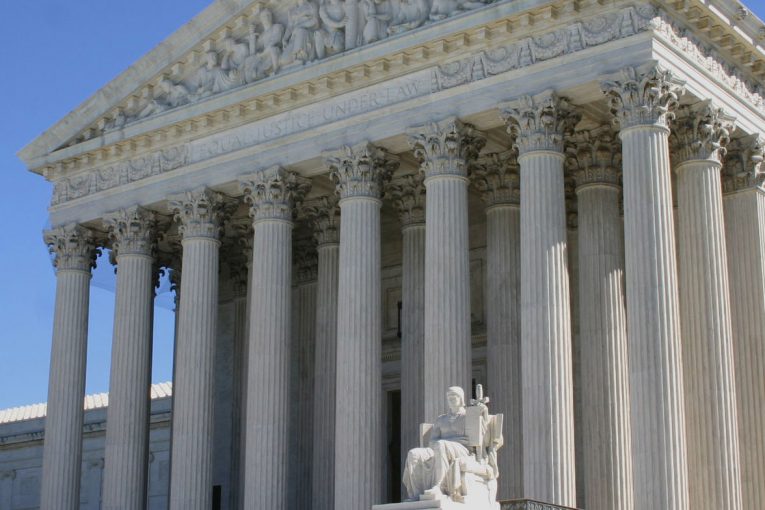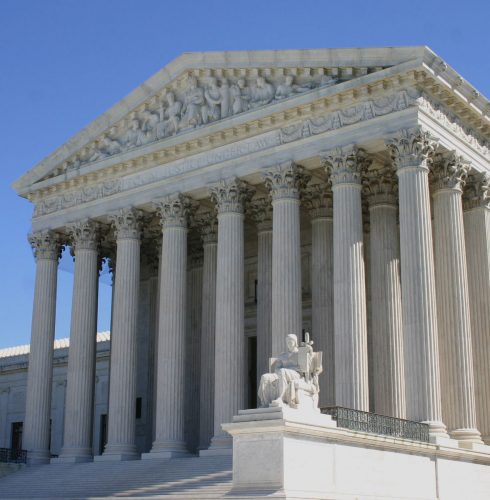

https://commons.wikimedia.org/wiki/File:US_Supreme_Court_DC.jpg
By Connie Martinez and Enola Gueta
WASHINGTON, DC – Many governors in red states are using the overturning of Roe v Wade by the U.S. Supreme Court to pass legislation upon expanding the death penalty, according to an article in Salon.
Republican governor of Florida Ron DeSantis was the first to sign into legislation the expansion of the death penalty, notes Salon: “Earlier this month, Tennessee Governor Bill Lee signed a bill authorizing the death penalty for aggravated rape of a child.
“Lee’s decision makes Tennessee the second state, following Florida, to apply capital punishment to cases where no one is killed,” said Salon, adding Idaho is now considering taking the same actions, making it the third red state to do so.
The article discloses “as the Death Penalty Information Center explains, (the actions) ‘contradict longstanding Supreme Court precedent holding the death penalty unconstitutional for non-homicide crimes.”’
Proponents of the new laws are looking forward to expansion toward the reach of capital punishment, add Salon, noting, “They also hope to put death penalty opponents on the defensive by painting them as soft-on-crime defenders of child rapists.”
The article indicates that for death penalty opponents, “their best political strategy, though it might not be a winning legal strategy, will be to say that the court should respect its own precedent rather than mounting a full-fledged campaign to explain why child rapists should not be put to death.”
As ruled by the Supreme Court, “In a 7-2 decision handed down in 1977, the court found that capital punishment was ‘grossly disproportionate’ to the crime of rape. Justice Bryon White, who wrote the majority opinion in Coker v. Georgia, turned to history to help explain that judgment,” the Salon article states.
Justice White, as quoted by Salon, stated that “no time in the last 50 years…have a majority of the States authorized death as a punishment for rape. In 1925, 18 States, the District of Columbia, and the Federal Government authorized capital punishment for the rape of an adult female. By 1971 … that number had declined, but not substantially, to 16 States plus the Federal Government.”
However, that situation shifted with the 1972 Supreme Court decision in Furman v. Georgia, said Salon, noting, following the decision, “more than 30 states reenacted their death penalty statutes, but few reauthorized it as a punishment for rape.”
White explains, “In reviving death penalty laws to satisfy Furman’s mandate, none of the States that had not previously authorized death for rape chose to include rape among capital felonies.”
White also adds in Salon, “It is highly reprehensible, both in a moral sense and in its almost total contempt for the personal integrity and autonomy of the female victim and for the latter’s privilege of choosing those with whom intimate relationships are to be established. Short of homicide, it is the ‘ultimate violation of self.”
“White insisted that ‘in terms of moral depravity and of the injury to the person and to the public … (rape) does not compare with murder, which does involve the unjustified taking of human life … The murderer kills; the rapist, if no more than that, does not … We have the abiding conviction that the death penalty, which “is unique in its severity and irrevocability,” is an excessive penalty for the rapist who, as such, does not take human life,”’ the Salon story states.
The article notes “in a case called Kennedy v. Louisiana, the Supreme Court reaffirmed that ruling and extended it to cover the rape of a child.”
However, Justice Anthony Kennedy argued, added Salon, “in determining whether the death penalty is excessive, there is a distinction between intentional first-degree murder on the one hand and nonhomicide crimes against individual persons, even including child rape, on the other.
“The latter crimes may be devastating in their harm, as here, but ‘in terms of moral depravity and of the injury to the person and to the public,’… they cannot be compared to murder in their ‘severity and irrevocability.”
The article also recognizes the political danger that such a decision puts officials into, stating, “Tennessee State Sen. Jack Johnson, who sponsored the bill, highlighted that both when he wrote in an op-ed he wrote last month in The Tennessean. Setting the political trap, he asked ‘Was the life of a rapist more valuable than the life of an innocent child who will be permanently scarred forever? In Tennessee, the answer is no.”’
Jack Johnson also explains, states Salon, Child Rape “is the most disgraceful, indefensible act one can commit, leaving lasting emotional and psychological wounds on its victims. As a legislator, and more importantly, as a human being, our responsibility to protect the most vulnerable comes first.”
The Salon article recognizes and states, “All five justices who supported the 2008 opinion are no longer members of the U.S. Supreme Court (Kennedy, Stevens, Souter, Ginsburg, Breyer). Three of the four justices who authored the dissenting opinion are still sitting justices (Roberts, Alito, and Thomas). Given the makeup of the current court, there is a strong possibility that Kennedy v. Louisiana could be overturned.”